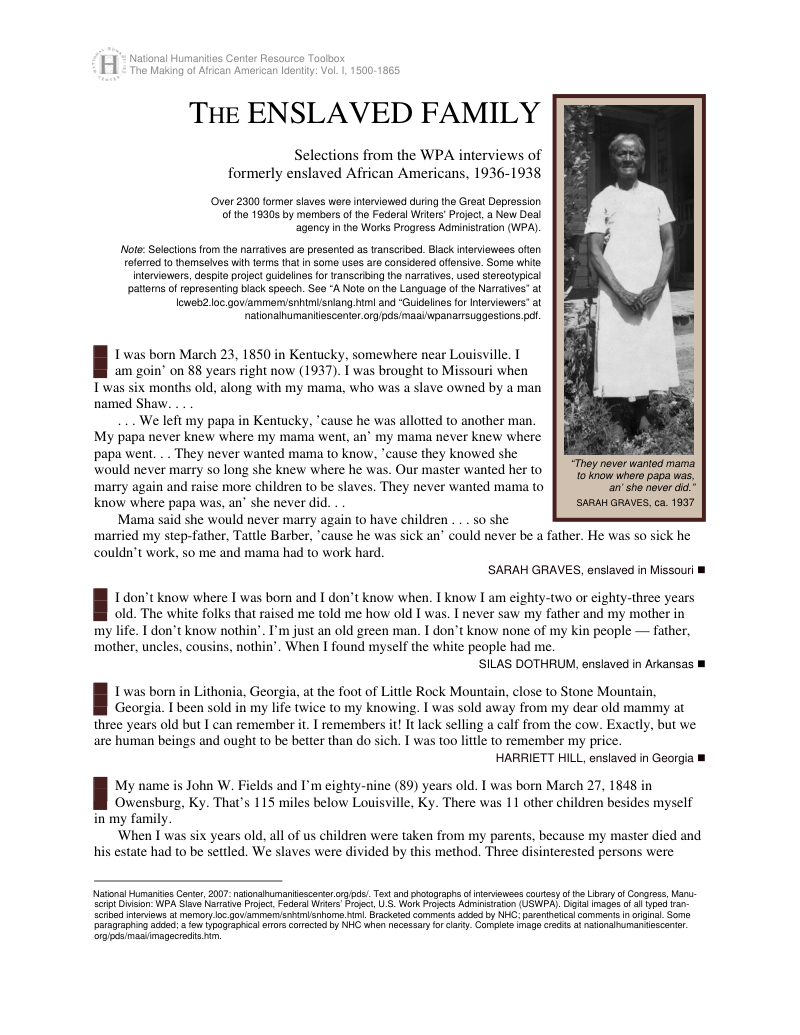National Humanities Center collection of Works Progress Administration (WPA) accounts of formerly enslaved people.
- Type
- Website
- Source
- National Humanities Center Non-LDS
- Hearsay
- DirectReprint
- Reference
"The Enslaved Family: Selections from the WPA Narratives 1936-1938," National Humanities Center, accessed December 7, 2023
- Scribe/Publisher
- National Humanities Center
- People
- National Humanities Center
- Audience
- Internet Public, Reading Public
- Transcription
...
I was born in Grand Bluff, in Mississippi, on Old Man Carlton’s plantation, and I was stole from my folks when I was a li’l gal and never seed them no more. Us kids played in the big road there in Mississippi, and one day me and ’nother gal is playin’ up and down the road and three white men come ’long in a wagon. They grabs us up and puts us in the wagon and covers us with quilts. I hollers and yells and one the men say, “Shet up, you nigger, or I’ll kill you.” I told him, “Kill me if you wants to ⎯ you stole me from my folks.”
Them men took us to New Orleans to the big slave market . . . I never knowed what they done with the other gal, but they sold me to Marse Bill Tumlin, what run a big livery stable in Jefferson [Texas], and I ’longed to him till surrender.
FRANCIS BLACK, enslaved in Mississippi and Texas
I seen chillun sold off and de mammy not sold, and sometimes de mammy sold and a little baby kept on de place and give to another woman to raise. Dem white folks didn’t care nothing ’bout how de slaves grieved when dey tore up a family.
KATIE ROWE, enslaved in Arkansas
[When] I was ’bout six or seven years ole, I reckon hit ’twas, Mr. Garret . . . bought ten of us chillun . . . Wa’n’t none of dem ten chillun no kin to me, and he never bought my mammy, so I had to leave her behine.
I recollect Mammy said to old Julie, “Take keer my baby chile (dat was me) and iffen I never sees her no mo’ raise her for God.” Den she fell off de waggin where us was all settin’ and roll over on de groun’ jes’ acryin’. But us was eatin’ candy what dey done give us for to keep us quite, and I didn’t have sense ’nuff for to know what ailed Mammy, but I knows now and I never seed her no mo’ in dis life. When I heerd [about] her atter S’render she done dead and buried. Her name was Rachel Powell. My pappy’s name I don’t know ca’se he done been sole to somewhars else when I was too little to recollect. But my mammy was de mother of twenty-two chillun and she had twins in her lap when us driv’ off. My gran’mammy said when I lef’ “Pray, Laura, and be er good gal, and mine bofe white and black. Ev’body will lack you and iffen you never see me no mo’ pray to meet me in heaven.” Den she cried. Her name was Rose Powell.
Us all started den for Mr. Garrett’s plantation down yonder in de bend, ten chillun and two ole uns, and two white men, and us was travellin’ solid a month. Fuss thing Ole Marsa say was “Now be good ter dese motherless chillun.” Den he went to war, and de overseers forgot all ’bout dey promise. When Ole Marsa come back he done got his arm shot off, but he let bofe dem overseers go, ca’se dey done whupped dat ole ’oman what come wid us to deaf. She brought her two little boys, Colvin and ’Lias, but Joe, dey pappy, didn’t come ⎯ he was sole ’fo Lias was bawn. Joe never seed ’Lias.
I sets cross de road here from dat church over yonder and can’t go ’ca’se I’m cripple’ and blin’, but I heers um singin’:
A motherless chile sees a hard time
Oh, Lord, he’p her on de road.
Er sister will do de bes’ she kin
Dis is a hard world, Lord, fer a motherless chile.
LAURA CLARK, enslaved in North Carolina
...
The B. H. Roberts Foundation is not owned by, operated by, or affiliated with the Church of Jesus Christ of Latter-day Saints.

